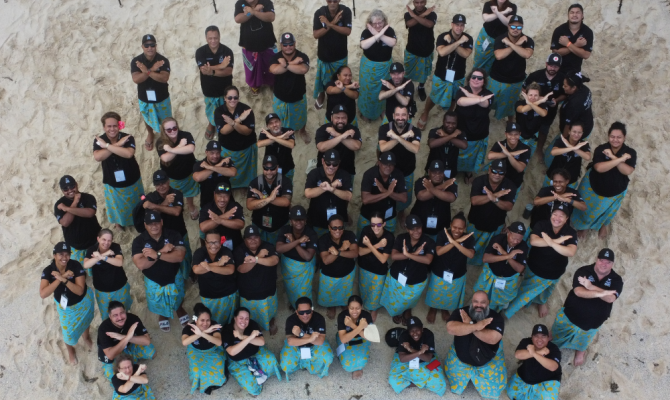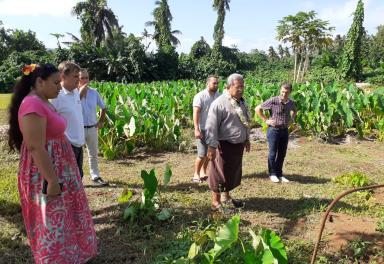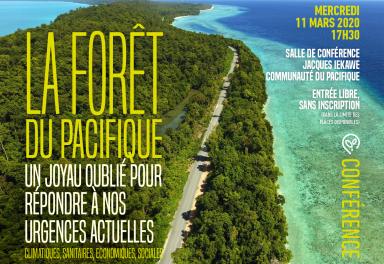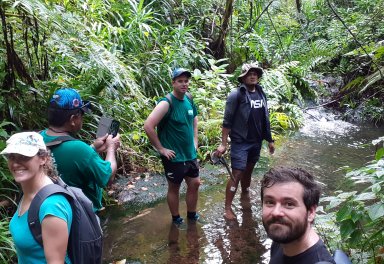Island and Ocean Ecosystems
The Fifth Pacific Invasive Learning Network (PILN) Meeting held in Apia, Samoa came to a close on 17 November after a successful week bringing together over 50 invasive species practitioners and professionals from across the Pacific region to share knowledge, expertise, tools, and ideas vital to managing invasive species effectively.
On this occasion, the project leaders of the PROTEGE project under the theme of Invasive Alien Species (IAS), namely the New Caledonian Biodiversity Agency and the Territorial Environmental Service of Wallis and Futuna, gathered alongside PROE, the implementing agency for the IAS theme project.
Looking back on the event organized by PROE:
In his welcome remarks, SPREP Invasive Species Adviser, Mr. David Moverley reflected on milestones achieved since the last PILN Meeting,
“In 2016, as a region, we were wrapping up the GEF-PAS Regional Invasive Species Project which provided an opportunity for much of the region to initiate or progress their national invasive species programmes and share in each other’s successes” he said. “Today as a region we have just updated the Guidelines of Invasive Species Management in the Pacific, established the Pacific Regional Invasive Species Management Support Service (PRISMSS) and are implementing a portfolio of activities over ten times what we were in 2016. We have significantly more support from donors, and we have the capacity and a plan to significantly step up invasive species management in the Pacific further”
Hosted by PRISMSS at the Secretariat of the Pacific Regional Environment Programme (SPREP), the meeting celebrated a number of significant milestones, kicking off with the highly anticipated 2023 Pacific Battler of the Year Award won by Tonga’s Viliami Hakaumotu, marking the first time the award has been celebrated in person.
After a 7-year hiatus due to the impact of Covid 19, the PILN Meeting was an opportunity for Pacific battlers to re-establish connections and inspire regional collaborative efforts towards invasive species management. Presentations were delivered by Members on behalf of 19 Pacific island countries and territories giving an overview of current national invasive species priorities and efforts to manage them effectively.
As part of the objective to raise awareness about the extensive support services provided by PRISMSS, the Navigator System was unveiled and introduced to members in a practical workshop conducted by GEF 6 Regional Invasive Species Coordinator, Mr. Josef Pisi, demonstrating the user-friendly online platform designed to streamline requests and store country and PRISMSS programme information such as invasive species indicators, capability development indicators and more.
In an interactive session facilitated by PRISMSS War On Weeds (WOW) Programme technical lead Mr. Josef Pisi, and Resilient Ecosystems Resilient Communities (RERC) Programme technical lead Mr. David Moverley, countries and territories were able to self-assess and determine their current capability levels and readiness to plan, manage or conduct a WOW or RERC programme.
The PRISMSS Protect Our Islands technical lead Dr. Monica Gruber of Pacific Biosecurity introduced the new clean boats, clean ports framework that will help enable countries and territories to better prevent the arrival, establishment and spread of invasive species. Eighteen countries completed clean boats, clean ports self-assessments, resulting in the first ever regional baseline for invasive species biosecurity.
The PRISMSS Natural Enemies, Natural Solutions (NENS) Programme team led by Ms.Lynley Hayes and Mr. Temo Talie of Manaaki Whenua – Landcare Research, facilitated a participatory discussion to identify the top priority invasive weeds for the region for which natural enemies could be developed in the near future.
In a throwback to the 2016 PILN Meeting held in Samoa at Manusina Beach Fales, participants returned to Saleapaga, Upolu where Mainstreaming Consultant, Mr. Steve Menzies of Flinch Marketing led a workshop focusing on helping PILN participants understand the valuable impact of the mainstreaming work with a special focus on using social marketing approaches to scale up the management of invasive species and increase climate resilience of Pacific Island ecosystems and communities.
Ms. Miliana Ravuso of BirdLife International based in Fiji delivered a presentation about the new Ecosystem Resilience Learning Network (ERLN) which seeks to build on the success of the PILN by establishing a regional network of local conservation practitioners outside of governmental agencies working in the invasive species management space to share lessons, experiences and solutions.
Looking ahead, participants expressed their eagerness to share and learn more success stories with increased engagement of professionals and practitioners from non-government organisations in the next five years. Members also shared their visions for their PILN teams to utilise PRISMSS sufficiently to address the management gaps in their countries and territories through its five programmes, with hopes that PRISMSS would include a marine invasive species management focus in its portfolio.
The fifth PILN Meeting is made possible with funding support from the Global Environment Facility funded GEF 6 Regional Invasives Project, the European Union funded PROTEGE project, the New Zealand Government funded Managing Invasive Species for Climate Change Adaptation in the Pacific (MISCCAP) project, and the Government of France through a FONDS Pacifique Grant focused on regional cooperation.








